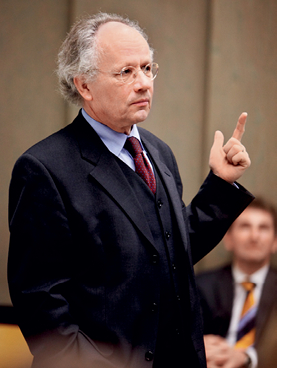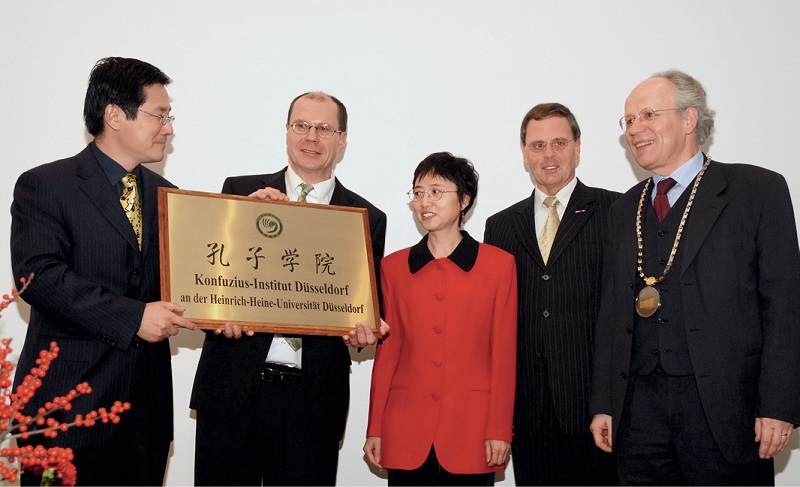
My China story, about the profound influence China has had on my life from childhood through to the present, is a long one that I hope will continue far into the future.
I spent a great deal of my boyhood, more than 65 years ago, leafing through all kinds of books, admittedly drawn more to their vivid illustrations than texts. They included travel literature encompassing works by German zoologist Ernst Haeckel on Insulinde, the Latin name for what we call today Indonesia. Wonderstruck at their exotic images, especially of volcanoes, I vowed to see these distant outposts for myself. My dream was to venture beyond Southeast Asia to East Asia as a whole – to Japan and, of course, to China.
I fulfilled all these childhood dreams, other than that of going to China, which seemed somehow out of reach. I should mention here my adherence to the old Chinese wisdom of traveling the world not as a tourist but as a visitor to places where I know local residents happy to show me the country from their own perspective. This opportunity eventually arose in 2004, with the news that the People’s Republic of China intended to set up Confucius Institutes analogous to Germany’s Goethe Institutes. At that time there was already a large community of Chinese citizens living in Düsseldorf. This was to be expected since the city, along with North Rhine-Westphalia, was a thriving economic hub for Chinese companies in both Germany and Europe in general. Today, Minmetals, ZTE, Huawei, Bank of China, and many other global concerns have established their German, if not European, headquarters in Düsseldorf, and there are 1,100 or more Chinese firms in North Rhine-Westphalia.
I was rector of the Heinrich Heine University Düsseldorf (HHU) when, in 2004, Werner Stüber, Peter Hachenberg, and Li Xuetao approached and asked me if I would be interested in establishing a Confucius Institute at the university. I immediately agreed. With the support of the university, the city of Düsseldorf, and the Hanban (Chinese National Office for Teaching Chinese as a Foreign Language), the founding of the “Confucius Institute at Heinrich Heine University Düsseldorf” accordingly took place in December 2006. Werner Stüber was at that time the director of the International Office of the HHU, Peter Hachenberg was a lecturer at the Beijing Foreign Studies University (BSFU) of five years’ standing, and Li Xuetao had just finished his dissertation at the University of Bonn under Wolfgang Kubin.
Having taken over presidency of the association supporting the Confucius Institute in Dusseldorf (CID) in 2006, I was appointed a member of the Hanban Council in 2007 and then made a senior consultant there in 2009. Finally, in 2011, I became an honorary member of the Hanban Council of the Confucius Institute Headquarters. By virtue of these posts and honors I have, since 2007, come to China at least once a year. Thanks to the annual congresses organized by the Hanban – the most international events I have ever attended – and the Council’s work meetings which Director General of the Hanban Madam Xu Lin organizes each summer, I have become more knowledgeable about China.
Our host university in China was, and remains, Beijing Foreign Studies University, where we stay every year. These frequent visits, which Germany reciprocates, have fostered ever closer contacts with the BSFU. The partnership has generated many jointly organized trips to China – to Xi’an, Chengdu, Chengde, Wuhan, Qingdao, Zhengzhou, Wuhu, Yangzhou, Hong Kong and many other places, as well as collaborative projects, lectures, and publications.
What, then, makes East Asia in general and China in particular so special – so distinctive? The desire of the earlier mentioned little boy to see exotic countries and travel to distant outposts have, of course, long since transmuted into intellectual journeys and spiritual adventures. In a nutshell, therefore, the answer to this question lies in Asia’s striking singularity when compared with Europe. But it is by studying Asia’s “otherness” that we Europeans may better understand our own culture and history. This, of course, also applies vice versa; the more that Asian, East Asian, and Chinese people learn about themselves, the deeper their knowledge of the history and culture of other countries, specifically of the “West,” becomes. The progression of such mutual interest may then culminate in advantageous cooperation, richer knowledge, and ultimately friendship.
So how can this “otherness,” which people have wrestled with since the West and the East first discovered one another, be defined? I can offer only my own interpretation here. As I am no Sinologist, speak only a little Chinese, and know few Chinese characters, it is based on the lifelong works of many thought leaders, my own work and discussions with Chinese scholars and students, and everyday experiences.
Upon going back to the origins of thought in Europe and in East Asia, we encounter a completely different approach to the world. As mentioned in the BFSU master’s and doctoral courses, the pre-Socratics – those European philosophers who taught before Socrates and Plato – perceived the recognizable world as separate from the recognizing subject, and hence sought the universal principles that explain nature in its entirety, from the origin and ultimate constituents of the universe to man’s place within it.
The dynamic world view of early East Asian thinkers, on the other hand, is reflected in the I-Ching and the Tao Te Ching, wherein things and beings are constantly reforming through ceaseless and inexorable confrontation and intermingling of various active forces. This obviates the need for any permanently ordered cosmos other than the world we know, whose constancy lies in change. The irreconcilable conclusions of this primal thought dyad are expressed in the dichotomy of the individual vs. the community. Life in China is considered in no other context than that of community; but in Europe, the combination of Greek philosophy and Judeo-Christian religion has nurtured a society and culture geared to the individual. Of course, geographical and biological conditions and historically long-term developments also play a role, and are the subject of historiography.

Alfons Labisch (first right) at the founding ceremony of the Confucius Institute at Heinrich Heine University Düsseldorf in Germany in December 2006.
At the time of the European Enlightenment China was an archetype – a giant empire with a history stretching back to prehistoric times, governed without a state religion or belief in one god but solely on the principle of community ordered according to fixed rites. The German polymath Gottfried Wilhelm Leibniz particularly admired the empire’s capacity to survive natural catastrophes and historical vicissitudes. The scientific revolution of Europe’s early modern era, meanwhile, expressed in the atomistic-mechanistic view of nature, mathematization, and the production of facts through experimentation, was ultimately rooted in its earliest philosophers, namely, Democritus and Heraclitus. Europe created scientific-technological modernity and spread it throughout the world through colonialism and imperialism. From a European perspective, therefore, China as perceived by Hegel and others suddenly became obsolete – an historical anomaly. This impression did not change until the turn of the 20th century and early 21st century. Today, China is the great power of the future – a fact that many people in the West may find difficult to understand, let alone accept.
To facilitate Chinese and Western cultural studies, BSFU has established, in close cooperation with CID, the Institute for Global History and the School of History, whose research theme is the Eurasian interchange of knowledge. Under the auspices of this immense, indeed formidable scholarship cosmos we try, through our projects, workshops, lectures, and teaching events, to shed specific light on various topics, and perhaps even to contribute a piece of mosaic to the overall picture. The following is some of the Institute’s activities.
In March 2011, the International Symposium “Medicine as a Medium of Multiple Modernities – Transactions and Contingencies between China, Germany and Japan in the 19th and Early 20th Centuries” was held at the Leopoldina Study Center of the German National Academy of Sciences. The authoritative scholar from China – as regards the symposium’s preparation, lectures, and eventual anthology – was Li Xuetao. From the globalization perspective, the international workshop’s aim was to grasp and examine the processes of modernization by reviewing it through the lens of medicine, thus creating background knowledge for current globalization issues.
In 2013, at the symposium “World Views from the Globe to Globalization” held at the Leopoldina Study Center, Li Xuetao presented his research on Matteo Ricci’s world map.
In 2016, Li Xuetao spoke at the Leopoldina’s annual conference “Sciences in Intercultural Dialogue” on the topic “Do modern sciences allow for cultural particularities?”
In 2017, I had the privilege of giving the keynote speech on “Eurasian Transfer of Knowledge vs. Eurasian Interchange of Knowledge” at the annual congress of the “Society for Cultural Interaction in East Asia” in Beijing.
I mention these four events as outstanding examples of our close cooperation and shared fundamental assumption of a vibrant exchange of East Asian and European knowledge since early human history. In regard to this loose research network of European and Asian scholars, we speak not of Portugal, England, or Germany, on the one hand, and of China, Japan, or Korea on the other, but of “Eurasia.” The topic, “knowledge exchange in Eurasia,” or “Eurasian interchange of knowledge” is being intensively addressed worldwide. The questions this project network must address, therefore, are: When did knowledge, whether implicitly or explicitly planned, spread in Eurasia? And in what ways? What were the intended and unintended consequences of this exchange of knowledge? The basic assumption is that, despite frequent exchanges of knowledge since prehistoric times, the identities of different cultures have nevertheless been preserved and remain instantly recognizable to this day. This observation is particularly important in light of globalization, and the extent to which the global exchange of knowledge, technology, skills, products, and services affects local, regional, and national cultures. Latent in this is both the expectation and task of preserving the “otherness” of various cultures, even in a global world, and applying them through the medium of a mutually fruitful cultural diversity.
Such diversity of topics and methods is reflected in the lectures and courses I have so far either given or conducted at the BSFU. Topics include historical theory and historiographical methods – such as those of French historian Fernand Braudel; the beginnings of knowledge in the East and West; medicine in the East and West; the Silk Road by Land and by Sea; the Axial Age and China; and of course, post-2020, plague, pestilence and the novel coronavirus. The theme of future events will be “global plagues as global history,” focusing on the different ways societies respond to the biological challenge of “new emerging diseases,” including SARS and COVID-19. In this regard China has set a shining example to the world, as no other country of its size and population has equaled China’s effectiveness in the fight against COVID-19. But how was this accomplished? And what are the historical and cultural implications of such an accomplishment?
I would be unable to present a scientific, or official BSFU “story” if not for my personal BSFU “story,” encompassing my trips to Beijing and throughout China, as well as to neighboring countries like Korea and Japan. This has been the researcher’s life that I have always dreamed of. 
ALFONS LABISCH is director emeritus of the Institute for Medical History at Heinrich Heine University Düsseldorf, a member of the German National Academy of Sciences Leopoldina and honorary professor at Beijing Foreign Studies University.